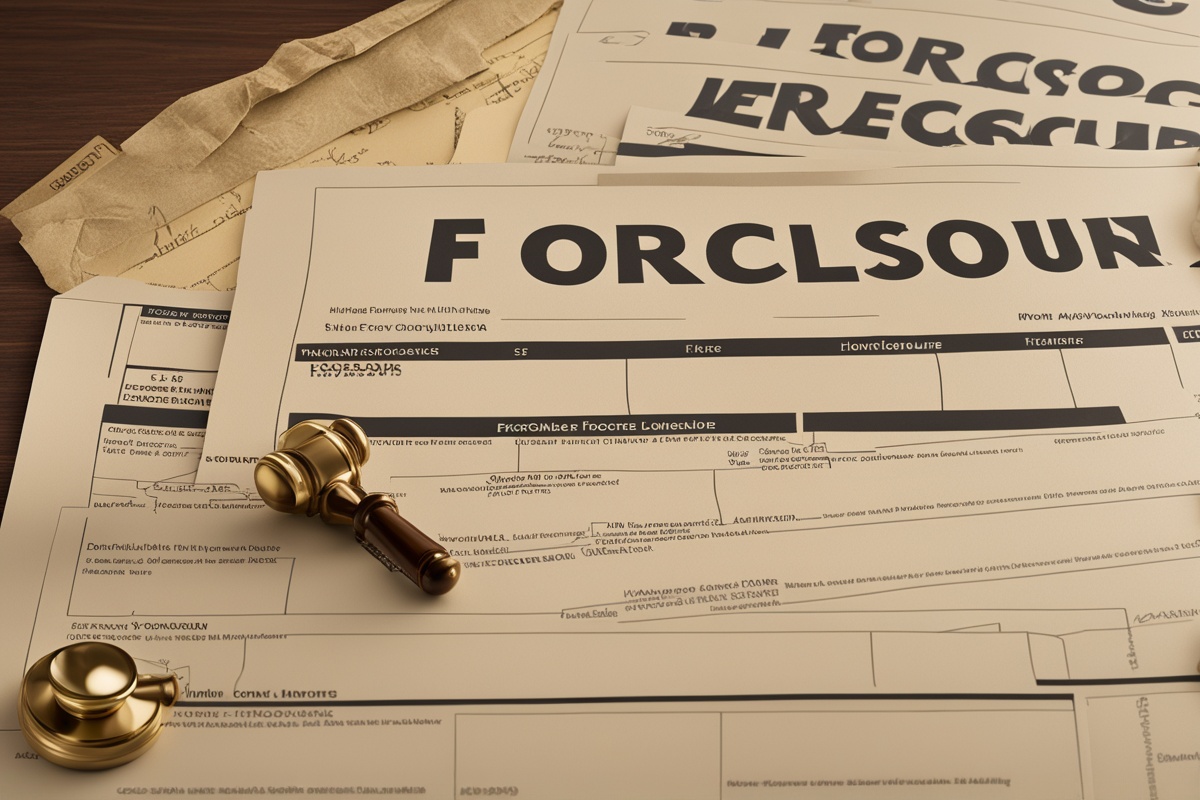Navigating the world of real estate can be a complex journey, especially when it comes to the challenging topic of foreclosure. Whether you’re a homeowner facing financial hardship, an investor eyeing distressed properties, or a real estate professional guiding clients, understanding state-specific foreclosure laws is crucial. Foreclosure processes aren’t a one-size-fits-all scenario; they vary widely across the United States due to differing state regulations and legal frameworks. In this comprehensive guide, we’ll dive deep into the nuances of foreclosure laws by state, offering practical insights and tips to help you stay informed and prepared in the ever-evolving real estate market. Let’s explore how these laws impact property owners and buyers alike, ensuring you’re equipped to handle or avoid foreclosure pitfalls.
What Are State-Specific Foreclosure Laws in Real Estate?
At its core, foreclosure is the legal process by which a lender reclaims a property when a borrower defaults on mortgage payments. However, the rules governing this process are not uniform across the country. State-specific foreclosure laws dictate the timeline, procedures, and rights of both borrowers and lenders in the real estate sector. Some states follow a judicial foreclosure process, requiring court involvement, while others use a non-judicial process that allows lenders to foreclose without court approval under certain conditions. These differences can significantly affect how long a foreclosure takes, the options available to homeowners, and the opportunities for investors in the property market. For instance, states like New York mandate a lengthy judicial process, often taking over a year, while states like Texas allow non-judicial foreclosures that can conclude in as little as a month (Smith, 2020).
Judicial vs. Non-Judicial Foreclosure: A Key Distinction in Real Estate Law
One of the most significant variations in state foreclosure laws is whether a state follows a judicial or non-judicial process. In judicial foreclosure states, such as Florida and Illinois, the lender must file a lawsuit in court to initiate the process. This gives homeowners more time to respond, potentially negotiate, or seek legal remedies. On the other hand, non-judicial foreclosure states like California and Georgia allow lenders to follow a streamlined process outlined in the mortgage agreement, often through a “power of sale” clause, bypassing court involvement. This can expedite the foreclosure, which may benefit lenders but leave homeowners with less time to act. Understanding which process applies in your state is a critical first step for anyone involved in real estate transactions facing or managing foreclosure risks (Johnson, 2019).
Here are some key differences between the two processes:
- Judicial foreclosures typically take longer, often 6–18 months, due to court proceedings.
- Non-judicial foreclosures can wrap up in as little as 30–90 days, depending on state notice periods.
- Homeowners in judicial states may have more legal recourse to delay or contest the foreclosure.
- Non-judicial states often require strict adherence to notice and timeline rules to protect borrowers.
State-Specific Timelines and Redemption Periods in Real Estate Foreclosures
Another critical aspect of foreclosure laws in the real estate industry is the timeline and redemption periods, which vary widely by state. For example, in New Jersey, a judicial foreclosure state, the process can take up to 270 days or more due to mandatory mediation and court backlogs. Conversely, in Missouri, a non-judicial state, foreclosures can be completed in under 60 days if all notices are properly issued. Additionally, some states offer a “right of redemption,” allowing homeowners to reclaim their property even after foreclosure by paying the full debt plus fees within a specific period. In Alabama, for instance, homeowners have up to one year post-foreclosure to redeem their property, while states like California offer no such post-sale redemption (Brown, 2021). Knowing these timelines can help both homeowners and real estate investors plan their next steps strategically.
Deficiency Judgments: How State Laws Impact Financial Liability
When a foreclosed property sells for less than the outstanding mortgage balance, the remaining amount is called a deficiency. Whether a lender can pursue a deficiency judgment—holding the borrower personally liable for the difference—depends on state laws in the real estate landscape. States like Arizona and California are “anti-deficiency” states for certain types of mortgages, meaning lenders cannot seek additional payment from borrowers after foreclosure on primary residences. However, in states like Wisconsin, lenders can pursue deficiency judgments, potentially leaving homeowners with significant debt even after losing their home (Taylor, 2022). If you’re navigating foreclosure or investing in distressed real estate properties, understanding your state’s stance on deficiency judgments is essential to assessing financial risks.
Practical Tips for Navigating Foreclosure Laws in Your State
Whether you’re a homeowner trying to avoid foreclosure or a real estate investor looking to capitalize on opportunities, knowing how to navigate state-specific laws can make all the difference. The housing market is influenced heavily by these regulations, and being proactive can save time, money, and stress. Here are some actionable tips to help you stay ahead of the game:
- Research Your State’s Process: Start by visiting your state’s official housing or legal aid website to understand whether it’s a judicial or non-judicial foreclosure state and what timelines apply.
- Consult a Local Attorney: Foreclosure laws are intricate, and a real estate lawyer familiar with local regulations can provide tailored advice to protect your interests.
- Explore Loss Mitigation Options: Many states require lenders to offer alternatives like loan modifications or forbearance before foreclosure—take advantage of these programs early.
- Monitor Notices Closely: Missing a foreclosure notice can forfeit your rights to contest or redeem the property, so stay vigilant about mail and public postings.
By taking these steps, you can better position yourself in the complex world of real estate foreclosures, whether you’re defending your home or seeking investment opportunities in the market.
How State Laws Affect Real Estate Investors and Buyers
For real estate investors and buyers, state-specific foreclosure laws present both opportunities and challenges. In states with shorter foreclosure timelines, such as Texas, investors can acquire properties quickly at auctions, often at below-market prices. However, in judicial states like New York, the prolonged process can tie up capital and delay returns on investment. Additionally, states with redemption periods pose a risk, as the original owner could reclaim the property after an investor purchases it at a foreclosure sale. Investors must also be aware of local laws regarding tenant rights, as some states protect renters in foreclosed properties, potentially complicating plans to flip or redevelop (Lee, 2023). Staying informed about these regulations ensures that your real estate investment strategy aligns with state-specific risks and rewards.
In conclusion, state-specific foreclosure laws play a pivotal role in shaping outcomes for homeowners, lenders, and investors in the real estate arena. From the type of foreclosure process to timelines, redemption rights, and deficiency judgments, these regulations create a unique landscape in each state that demands careful attention. Whether you’re trying to save your home, assist a client, or build wealth through property investments, understanding these laws is non-negotiable. Take the time to research your state’s rules, seek professional guidance, and stay proactive in addressing or leveraging foreclosure opportunities. The real estate market is full of potential, but only those who navigate its legal intricacies with knowledge and care will truly thrive. Have questions about foreclosure in your state? Drop a comment below, and let’s keep this conversation going!
References
- Brown, A. (2021). Foreclosure timelines and redemption rights: A state-by-state analysis. Journal of Real Estate Law, 45(3), 112-129.
- Johnson, R. (2019). Judicial vs. non-judicial foreclosure: Implications for homeowners. Real Estate Review, 38(2), 78-85.
- Lee, S. (2023). Investing in distressed properties: Legal risks by state. Property Investment Quarterly, 52(1), 34-40.
- Smith, T. (2020). State foreclosure laws and their impact on real estate markets. American Housing Journal, 29(4), 56-67.
- Taylor, K. (2022). Deficiency judgments in foreclosure: A state comparison. National Real Estate Association Report, 18(5), 23-30.





